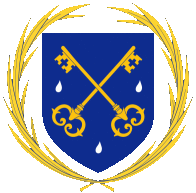
- This event has passed.
Chesterton Society Meeting
September 20, 2016 @ 7:30 pm - 9:00 pm
We’re on the last chapter of Part One of The Everlasting Man – Chapter VIII, The End of the World. This puts us more than half way through the book, but still a good seven or eight months from finishing it. Our last chapter was about the conflict between Rome and Carthage that issued into the Punic Wars and ultimately the defeat and destruction of Carthage. Chesterton spent a great portion of that chapter to show us the spiritual/moral antagonism between the two great empires was essentially a religious conflict and the Punic Wars were essentially a religious war – where two incompatible and opposing views of the world come into conflict. Rome was, for lack of a better word, a domestic empire in that they exalted the family – the hearth and home – and familial piety. Carthage,on the other hand, was a commercial empire intent on extending its markets. For them everything must be sacrificed for business. Even their religion, such as it was, was an effort to placate the gods in furtherance of commerce. To the Romans family was sacred and stood apart from the state and could therefore look at it objectively and critically. Even Roman religion was centered in the home. To the Carthaginians everything had to bow to the state – there was no higher or separate authority. Rome was really fighting for something that was an anchor of Western Civilization and their ultimate outcome of the wars ensured it wouldn’t be supplanted by Carthage’s vision.
Even so, as this month’s chapter shows us, Rome went into a decline and twilight descended on the glory that was Rome. From the time of Augustus on the Republic grew more and more tyrannical and totalitarian. But Chesterton also points out the degeneration is essentially religious:
“Only as the whole society grew in age and experience, there began to appear that weakness in all mythology already noted in the chapter under that name. This religion was not quite a religion. In other words, this religion was not quite a reality. It was the young world’s riot with images and ideas like a young man’s riot with wine or love-making; it was not so much immoral as irresponsible; it had no foresight of the final test of time. Because it was creative to any extent it was credulous to any extent. It belonged to the artistic side of man, yet even considered artistically it had long become overloaded and entangled. The family trees sprung from the seed of Jupiter were a jungle rather than a forest; the claims of the gods and demi-gods seemed like things to be settled rather by a lawyer or a professional herald than by a poet. But it is needless to say that it was not only in the artistic sense that these things had grown more anarchic. There had appeared in more and more flagrant fashion that flower of evil that is really implicit in the very seed of nature-worship, however natural it may seem. I have said that I do not believe that natural worship necessarily begins with this particular passion; I am not of the De Rougemont school of scientific folk-lore. I do not believe that mythology must begin with eroticism. But I do believe that mythology must end in it. I am quite certain that mythology did end in it. Moreover, not only did the poetry grow more immoral, but the immorality grew more indefensible. Greek vices, oriental vices, hints of the old horrors of the Semitic demons began to fill the fancies of decaying Rome, swarming like flies on a dung heap. The psychology of it is really human enough to anyone who will try that experiment of seeing history from the inside There comes an hour in the afternoon when the child is tired of ‘pretending’; when he is weary of being a robber or a Red Indian. It is then that he torments the cat. There comes a time in the routine of an ordered civilisation when the man is tired at playing at mythology and pretending that a tree is a maiden or that the moon made love to a man. The effect of this staleness is the same everywhere; it is seen in all drug-taking and dram-drinking and every form of the tendency to increase the dose. Men seek stranger sins or more startling obscenities as stimulants to their jaded sense. They seek after mad oriental religions for the same reason. They try to stab their nerves to life, if it were with the knives of the priests of Baal. They are walking in their sleep and try to wake themselves up with nightmares.”
I think that’s my favorite passage in the whole book.
Our Father Brown story this month is The Crime of the Communist It is the 48th story we’ve read, leaving only three more. What will we read once we finish reading The Complete Father Brown?
Good reading, and see you all on the 20th!
Spencer


 5461 44th Street
5461 44th Street
